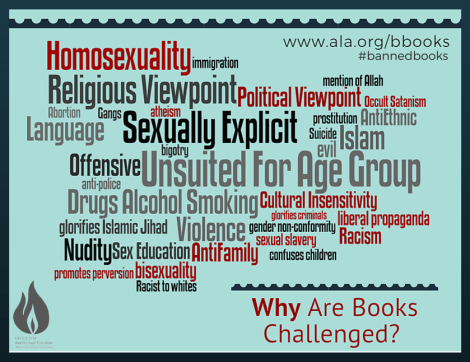UNITED STATES
Learn more about challenged and banned books with our resources, polls, and maps.
Teachers, scroll down for a quick list of key resources in our Teachers Toolkit.

Discussion Ideas

- This week is Banned Books Week in the United States. What are some of the leading reasons books are challenged or banned? Take a look at this study guide for some help.
- Depictions of sex and sexuality, offensive language, and perceived inappropriateness for the book’s targeted age group are the leading reasons books are challenged or banned.
- James LaRue, director of the American Library Association Office for Intellectual Freedom, says that “most of the 275 challenges to books recorded by the ALA came ‘from parents seeking to preserve the innocence of their children about topics such as racial conflict or sex or gender in its many manifestations’.”
- Books by diverse authors or featuring diverse content are disproportionately challenged or banned. How does the American Library Association define diversity?
- The ALA definition of diversity includes “those who may experience language or literacy-related barriers; economic distress; cultural or social isolation; physical or attitudinal barriers; racism; discrimination on the basis of appearance, ethnicity, immigrant status, religious background, sexual orientation, gender identity, gender expression; or barriers to equal education, employment, and housing”.
- The ALA relies on research that defines diverse content as having:
- a non-white main or secondary character
- an LGBT main or secondary character
- a disabled main or secondary character
- issues about race or racism
- LGBT issues
- issues about religion (including works about the Holocaust and terrorism)
- issues about disabilities or mental illness
- a non-Western setting (outside North America and Europe)
- Why do you think books with diverse content are disproportionately challenged and banned? There is no right answer here.
- One writer thinks “[b]ecause the definition of diversity stems from what is considered to be outside the norm it has frightened parents who want to protect their children from overexposure.”
- Another author outlines why these challenges silence minority perspectives, although that may not be the intention.
- Judith Platt, director of free expression advocacy at the Association of American Publishers, says people challenge or ban “books dealing with people or situations that are unfamiliar or strange to the majority of Americans … Books that feature people of color, people with disabilities and people seeking answers to questions about gender identity create opportunities for learning and openness. This is the only way we can ever hope to stop being ‘them and us’ and become ‘we’.”
- What are some approaches to introducing, teaching, and communicating the merits of challenged or banned books?
- There is no panacea. Each individual’s reaction to a book is discrete, and the discourse of each group or class is unique.
- One teacher says “I wish I had asked the parent who challenged [Johnny Got His Gun, by Dalton Trumbo] to read the entire book so we could have an authentic conversation about the text as a whole. I know I could have learned something from her perspective and I hope she could have learned something from mine.”
- Another teacher recommends developing high-quality and well-prepared lessons, and always be ready to adapt, modify, iterate, and improve.
- In a great pedagogical analysis, teachers unpack strategies for “using banned books as a vehicle for teaching about World War II-era Japan and Korea.” (The strategies can be applied to other cultures and time periods.)
- Another group offers an outline on how to use the Common Core to teach controversial issues and texts.
- NCTE offers support and guidance in developing rationales for teaching controversial or challenged literature.


TEACHERS TOOLKIT
American Library Association: Banned Books Week
The Guardian: Banned Books Week launches with call to read books the ‘closed-minded’ want shut
Nat Geo: ‘Banned Books Week’ Champions Challenged Literature
Banned Books Week: Taking the Risk to Teach Diverse YA Books
Diversity in YA: Book Challenges Suppress Diversity
Multicultural Education: Are We Comfortable Teaching This? Using Banned Books as a Vehicle for Teaching about World War II-Era Japan & Korea
Wisconsin English Journal: Teaching Controversial Young Adult Literature with the Common Core


One thought on “Banned Books Week: Celebrating Diversity”